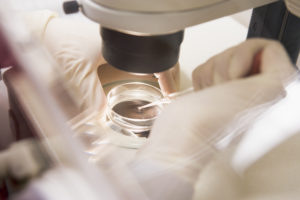What is IVF?

In vitro fertilization, or IVF, is an assisted reproductive technology (ART) procedure used to achieve pregnancy. IVF is the most effective form of ART and can have excellent success rates, depending on factors including maternal age and the cause of infertility. It is sometimes expensive but also covered by insurance under certain circumstances.
How Does IVF Work?
IVF is a process that includes a series of timed, sequenced procedures – an IVF cycle. Before starting an IVF cycle, you’ll have a thorough fertility workup, including (as relevant) ovarian reserve testing, semen analysis, infectious disease screening, a uterine exam, and a possible mock embryo transfer.
Once that testing is complete, the next step is ovarian stimulation using medication. Patients take follicle-stimulating hormone (FSH), luteinizing hormone (LH), or both (these are intramuscular injections to take at home). Once your follicles are ready for retrieval, which takes between one and two weeks, you’ll take human chorionic gonadotropin (HCG), which helps the eggs finish maturing. Your doctor may also prescribe medicine to help prevent premature ovulation and/or progesterone, helping prepare your uterine lining for implantation.

Egg Retrieval
The next step is egg retrieval, completed in a doctor’s office or fertility clinic. The timing for your egg retrieval must be precise and will take place 34-36 hours after your final injection, before ovulation. This minor surgical procedure happens under intravenous sedation medication. Your doctor will use an ultrasound to guide a needle into your follicles, where it will extract multiple eggs using a suction device. The procedure takes about twenty minutes, and you’ll likely feel soreness, cramping, and pressure when you wake up. People with endometriosis or other complications may experience more pain.
Sperm Sample Collection
The sperm sample collection occurs at a specific time during your IVF cycle. If you’re using donor sperm, your fertility doctor’s office should receive the sperm on the morning of your egg retrieval (unless they have cryostorage capabilities). When using a partner’s sperm, they will need to produce the sample on the morning of the egg retrieval so that it is fresh. If they are utilizing testicular aspiration, the reproductive endocrinologist will need to work closely with your fertility doctor to ensure the sequencing of both procedures occurs correctly.
After the egg and sperm retrieval, the next step is fertilization. The two methods typically used are:
- Conventional insemination, when the eggs and the sperm incubate in a lab overnight, and
- Intracytoplasmic Sperm Injection (ICSI), where the lab injects one healthy sperm inside each mature egg.
When semen quality or quantity is an issue, or when previous cycles of IVF haven’t resulted in pregnancy, ICSI is an excellent option for increasing the rate of IVF success.
Embryo Transfer
Finally, the last step of the IVF cycle is embryo transfer at your doctor’s office or fertility clinic two to five days after the egg retrieval (unless you are freezing your embryos for later use). For the transfer, patients are under a mild sedative. For some people, the transfer is painless. Significant cramping and discomfort can occur for others as the doctor inserts a catheter through the vagina and cervix and into the uterus. The doctor will then place the embryo(s) into the uterus using a syringe attached to the end of the catheter.

When an IVF cycle succeeds, an embryo will implant in about a week or ten days after the transfer. In twelve days, your doctor will take a sample of your blood to complete a pregnancy test.
Who Should Try IVF?
IVF is highly effective for infertility of various causes, particularly ovulation problems, obstructed or damaged fallopian tubes, endometriosis, pelvic adhesions, and unexplained infertility. Male factor infertility using a sperm donor is another example of how IVF helps parents build their families.
Used together with a diagnostic process called preimplantation genetic testing, IVF helps patients who are carriers of congenital disease. In this procedure, eggs retrieved with an IVF protocol get tested for genetic abnormality before incubation.
People also use IVF in other cases when parents use gestational carriers. Unlike traditional surrogacy (in which a surrogate conceives the pregnancy with their own eggs), a gestational carrier does not share genetic material with the child they are carrying. Thus, IVF is needed for the biological parent’s eggs to become the embryos that impregnate the gestational carrier.
Other candidates for IVF are people who have lost fertility due to cancer, radiation, and/or chemotherapy.
Expense, Success Rates, and Side Effects
IVF is quite expensive, typically costing between $15,000 and $30,000. In the US, some states require insurance carriers (by law) to cover a certain number of IVF attempts.
Many factors influence the expected rate of success with IVF. Age (people in their 20s and 30s have higher rates of live births than those who are older), fertility history, and specific infertility diagnosis are all considerations. This handy IVF success estimator tool from CDC can help you understand your chances of success.
Using Science to your Family’s Advantage
IVF is a reliable, evidence-based method of using reproductive technology advances over the years to help you build the family of your dreams. IVF can feel daunting—and for understandable reasons. It’s expensive, complicated, and involved – financially, mentally, and physically. It’s also one of the best chances an infertile person has of conceiving a pregnancy.
Did you miss our blogs on two other methods for building a family? Read up on ICI (Intracervical Insemination) and IUI (Intrauterine Insemination) to learn more about how these procedures help create families.
Have questions about what vial type to purchase for IVF or other insemination procedures? View our Specimen Information page to learn more.
Are you searching for the perfect donor? Find him today!







